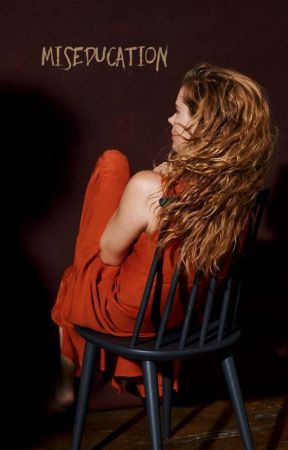"It gets tricky when it comes to personality disorders," The redhead explained, pointing with her pencil to a paragraph in the text, "Say a patient is presenting with a lack of empathy and remorse, very low levels emotional expression, marked impulsivity, and their history indicates a pattern of failed relationships, romantic and otherwise. What's the first thing that comes to mind?"
I faltered. "Patient's age, gender, and medical history?"
She considered it for a moment before replying. "Twenty-five, male, diagnosed with Oppositional Defiant Disorder at age nine." She grinned, "I'm practically giving you the answer, Elsie! Come on, you know this."
"You're really not," I grumbled, bringing my hand to my head in irritation, "Obviously you want me to say Antisocial Personality Disorder," I gave her a pointed look, "And obviously I'd be wrong."
"Not necessarily," She admitted, "Maybe seventy-five percent of the time you'd be right, and it's easy to let that seventy-five percent convince you that the obvious choice is always the right one. You can't operate that way as a psychologist, which is why it's so important to consider all of the information available to you before making a diagnosis. Those traits are all symptomatic of AsPD, but think about context for a second. Genetics and environment. The patient doesn't know if he has a familial history of mental illness because he grew up in a group home after being removed from his parents as an infant. As your sessions progress, you notice that he's detached, distrustful, controlling, and at times appears to be profoundly lonely, yet he seems incapable of forming bonds with other people. What can you infer from that?"
"That I'm completely unqualified for my job because I have no idea what to —" Adelaide raised an eyebrow and I cut myself off, the gears in my head spinning. "Reactive Attachment Disorder!" I practically shrieked, earning a proud smile from the TA.
"Exactly!" She applauded, "It's never as cut-and-dry as we think, but I know you know what you're doing. Don't tell Professor Stevens I told you this, but that example is going to be on the midterm. It's going to be heavy on the Cluster B's, so can you tell me what should be kept in mind before diagnosing BPD, for example?"
"Complex trauma," I replied quickly, "The diagnostic criteria for BPD shares enough traits with C-PTSD for a misdiagnosis to be made if one fails to consider a patient's history of prolonged trauma, especially in early childhood." I frowned, "Adelaide, why did you change your major? You know you could have Stevens' job if you wanted it, and you were only three credits away from your PhD."
Adelaide shifted in her seat, her discomfort evident in her expression. "I'd be a terrible teacher," She brushed it off, "And an even worse psychologist. I'm happy in marketing."
"No you're not," I chided, "I know you hate talking about yourself, but why the fuck did you pick marketing?"
Over the course of my four and a half years at WWU, Adelaide DaCosta was a name I'd heard often. She was brilliant, by all accounts, and undoubtedly the most promising student to come out of the Experimental Psychology program. During my undergrad, I'd been awestruck to learn that masters thesis I'd often seen her working on in the library had been published both by the AJP and the Journal of Abnormal Psychology. It was absolutely unheard of, and, to an average student such as myself, she was nothing short of spectacular.
When I heard the rumour that Adelaide would be TA'ing for the 500 level Adult Psychopathology class, I signed up on the spot, disregarding the fact that I already had a full course-load and didn't actually need the class. Did I struggle with the concepts we were studying in class? Sure. Did I absolutely need to sign up for private tutoring? Probably not, but she didn't need to know that.
As my hero-worship infatuation with the twenty-eight year old prodigy faded and I ceased to stumble over my words every time she spoke to me, I came to enjoy her company. At first she'd seemed cold and distant, and I'd fought my instinct to prescribe her with a label from my repertoire of diagnoses (narcissistic traits, maybe? No, that couldn't be it. She was always too willing to downplay her intelligence). There was no avoiding the fact that Adelaide was a strange woman, but no stranger than her fellow academics.

YOU ARE READING
Miseducation
RomanceElsie Tyler was an expert in juggling the impossible, that is, until she met Adelaide DaCosta. Graduate school certainly wasn't supposed to be a walk in the park, but nothing could have prepared Elsie for the year ahead of her.

